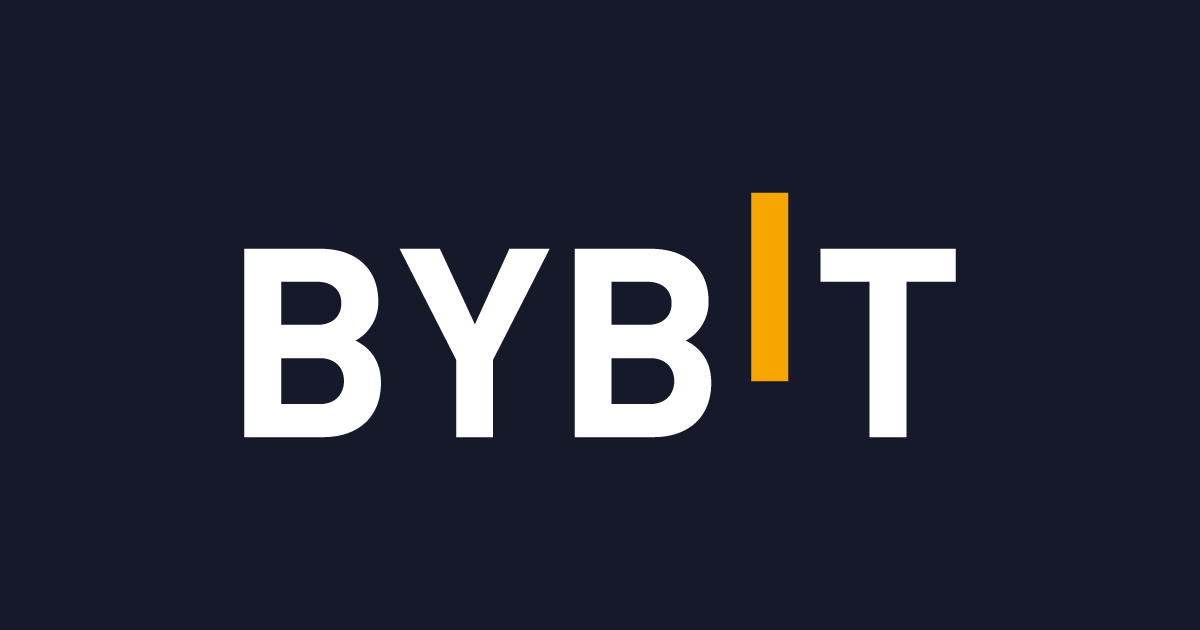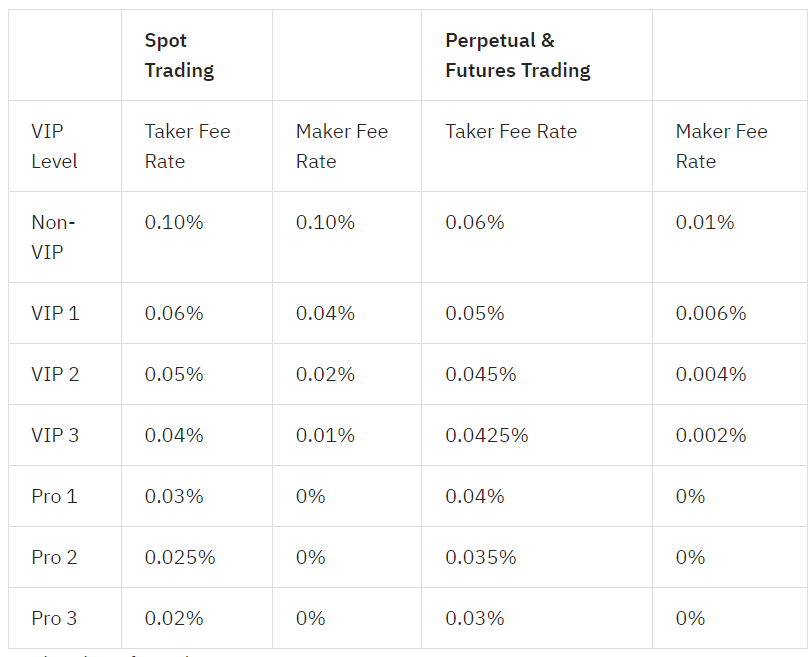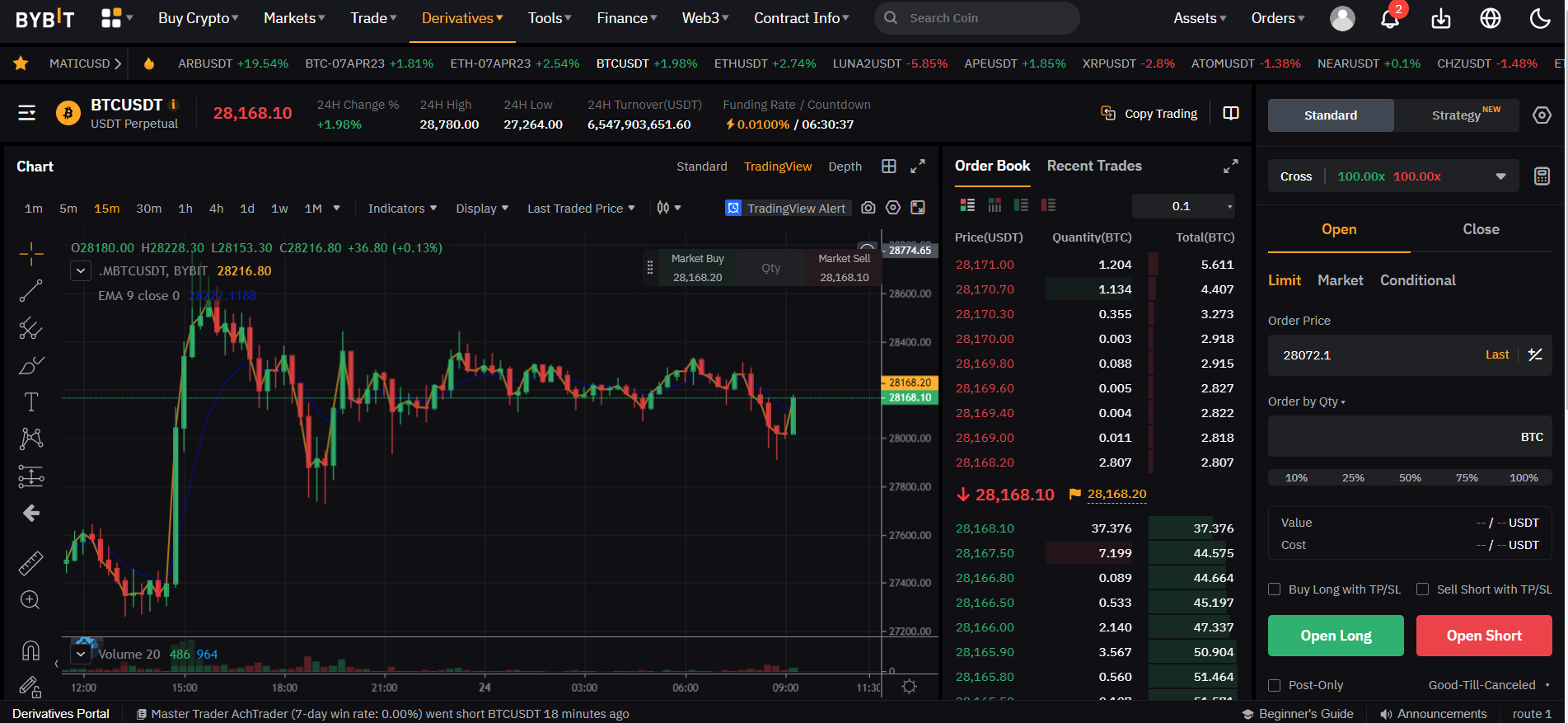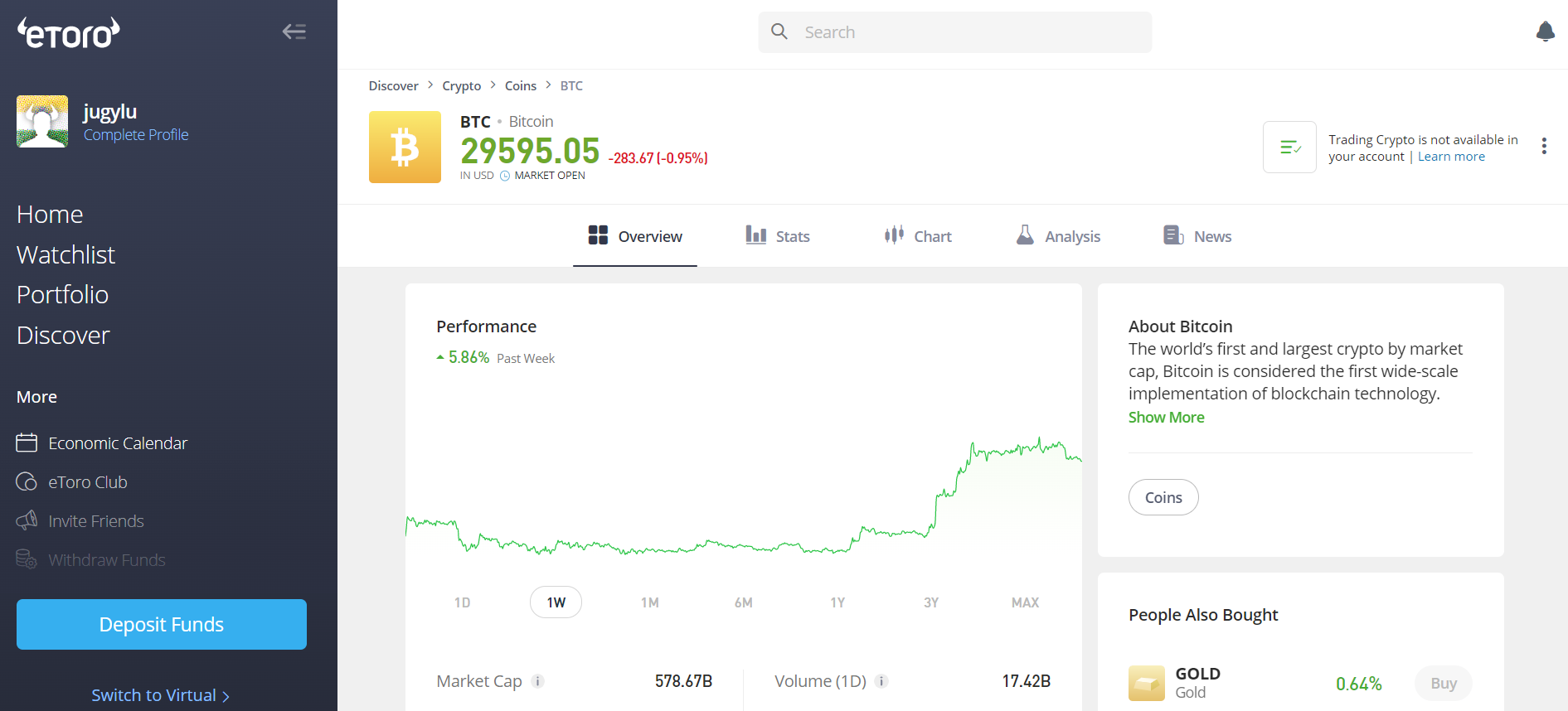As a cryptocurrency trader, I am always on the lookout for the best trading platforms to enhance my trading experience.
With the growing popularity of Bybit and eToro, I find myself torn between the two.
Bybit is a derivatives exchange platform, focusing on Futures trading, while eToro is a social trading platform that has stocks, forex, and cryptocurrencies.
To make an informed decision, I decided to compare the two.
In this article, I will share everything I have learned about Bybit vs eToro, their features, and their unique trading options to help fellow traders make the right choice for their trading needs.
Bybit vs eToro: At a Glance Comparison
| Feature | Bybit | eToro |
| Supported assets | 50+ Fiat currencies, 20+ cryptocurrencies | 3000+ assets, including Stocks, Forex, Cryptos |
| Margin trading | Yes | Yes |
| Leverage | Up to 100x | Up to 30x |
| Trading fees | Maker: 0% to 0.02%
Taker: 0% to 0.05% |
0% – 1%, depending on the asset |
| Trading platform | Web, mobile app | Web, mobile app |
| Security features | 2-factor authentication, cold storage | 2-factor authentication, SSL encryption |
| Customer support | 24/7 live chat, email support | 24/7 live chat, email support |
Bybit vs eToro: Trading Markets, Products & Leverage Offered
Bybit specializes in Futures trading and offers Perpetual contracts for leading cryptocurrencies as well as contracts with fixed expiry dates.
Bybit also offers up to 100x leverage on its trading products. Also, it offers you sign-up bonus when you use Bybit promo code.
On the other hand, eToro is a social trading platform that offers a wide range of trading products, including stocks, forex, commodities, and cryptocurrencies.
It allows traders to buy and sell stocks, as well as trade CFDs (contracts for difference) on various assets. eToro also offers leverage of up to 30x on certain trading products.
Both platforms offer margin trading, which means traders can borrow funds to increase their buying power and potentially generate higher profits.
Verdict: Traders looking for high leverage may prefer eToro, while those looking for cryptocurrency Futures trading may prefer Bybit.
Bybit vs eToro: Supported Cryptocurrencies
Bybit offers Futures trading for Bitcoin, Ethereum, and other top crypto coins. It also supports Perpetual contracts for these cryptocurrencies, which means traders can hold positions for as long as they want.
On the other hand, eToro supports a wide range of cryptocurrencies but traders do not own the underlying asset when trading there. Instead, they trade CFDs that track the price of the asset.
Verdict: eToro is the clear winner if you are looking for a wider variety of assets for trading but does not allow users to hold the actual asset.
Bybit vs eToro: Trading Fee & Deposit/Withdrawal Fee Compared
Bybit charges a trading fee ranging from 0% to 0.05% depending on the type of contract and the user’s trading volume.
Bybit also charges a funding fee, which is the cost of holding a position open for a certain period of time. This fee is based on the prevailing interest rate and the demand for the asset in the market.
For deposits and withdrawals, Bybit only supports cryptocurrency transactions. There are no fees for deposits, but there are minimum deposit amounts depending on the cryptocurrency.
Withdrawals are subject to a small network fee, which varies depending on the cryptocurrency.
eToro has a fee structure according to the asset you are trading. The platform charges trading fees of $0 on stocks, and 1% on cryptocurrency.
eToro also charges withdrawal fees, which vary depending on the currency and the amount being withdrawn. Deposits on eToro are generally free, but certain payment methods may incur a small fee.
Verdict: In terms of fees, Bybit is the winner here for cryptocurrency transactions as eToro charges a flat 1% fee on all its transactions, whereas Bybit has a maker-taker model with a maximum of 0.05%.
Bybit vs eToro: Order Types
Bybit offers
- Limit Order
- Market Order
- Conditional Order
- Stop-Limit Order
eToro offers
- Limit Order,
- Market Order, and
- Stop-loss Order
Verdict: Bybit offers conditional orders, which can be useful for automated trading strategies, while eToro offers stop-loss orders to help limit potential losses.
Bybit vs eToro: KYC Requirements & KYC Limits
Bybit’s KYC verification process is relatively simple and requires users to provide their name, date of birth, address, a selfie, and a government-issued ID.
There are three levels of KYC verification at Bybit, each has its daily and monthly withdrawal limits. The table below shows this in an easy-to-understand way.
| KYC Level -> | Non-KYC | Individual KYC Lv. 1 | Individual KYC Lv. 2 |
| Daily Withdrawal Limit | ≤ 20,000 USDT | ≤ 1M USDT | ≤ 2M USDT |
| Monthly Withdrawal Limit | 100,000 USDT | No Cap | No Cap |
eToro’s KYC verification process is similar and requires the user to upload their proof of identity (PoI) and their proof of address (PoA) to get started. By regulations, all new accounts on eToro must be KYC’d.
Verdict: Bybit allows you to trade on their platform up to a certain extent, but eToro does not have this option. So if you are looking to not KYC but still trade, Bybit should be your platform of choice.
Bybit vs eToro: Deposits & Withdrawal Options
Bybit only supports cryptocurrency deposits and withdrawals. There are no deposit fees on Bybit, but users will need to pay a small network fee when they withdraw funds from the platform.
eToro supports a range of deposit and withdrawal options, including bank transfers, credit/debit cards, and online payment systems such as PayPal.
Deposits are generally free, but certain payment methods may incur a small fee. Withdrawals on eToro are subject to withdrawal fees, which vary depending on the currency and the amount being withdrawn.
Verdict: Bybit only supports cryptocurrency transactions, while eToro supports a range of payment methods, including bank transfers, credit/debit cards, and online payment systems, so clearly eToro is the winner in this category.
Bybit vs eToro: Trading & Platform Experience Comparison
Bybit’s platform offers a simple and intuitive interface. The platform is known for its fast and reliable order execution, which is essential for active traders.
Bybit also offers a range of advanced trading tools, such as limit orders, stop-loss orders, and take-profit orders. The platform also offers a mobile app that allows traders to manage their accounts and trade on the go. To know more about the exchange, have a look at this quick Bybit tutorial.
eToro’s platform is designed to cater to a wider range of traders, including those who are new to trading.
The platform offers a range of trading tools and features, including social trading, copy trading, and a demo account for beginners.
eToro also offers a mobile app that allows you to manage your trades while you are away from your trading desk.
Verdict: If you’re an experienced trader who is looking for advanced trading tools and features, then Bybit is the better choice. However, if you’re a beginner or a trader who wants to engage in social and copy trading, then eToro is the better choice.
Bybit vs eToro: Customer Support
Bybit offers customer support via live chat and email. The support team is available 24/7 to help traders with any issues or questions they may have. The response time for the live chat is generally fast, and the support team is knowledgeable and helpful.
eToro also offers customer support via live chat and email.
The support team is available 24/5 to help traders with any issues or questions they may have. The response for the chat is usually fast, and the support team is looking to help and know their stuff.
In addition, to live chat and email support, eToro also offers a comprehensive FAQ section that covers a range of topics, including trading, deposits, withdrawals, and account management.
Verdict: eToro’s comprehensive FAQ section gives it a slight edge over Bybit in terms of customer support.
Bybit vs eToro: Security Features
Bybit uses a range of security features, including two-factor authentication (2FA), SSL encryption, and cold storage for the majority of user funds.
The platform also has a robust risk management system in place to monitor trading activity and prevent unauthorized access.
eToro also uses a range of security features, including 2FA, SSL encryption, and cold storage for user funds. The platform also has a comprehensive security policy in place that includes regular security audits and penetration testing.
Verdict: Bybit’s focus on risk management and its use of cold storage for the majority of user funds give it a slight edge over eToro in terms of security.
Is Bybit Safe & Legal To Use?
Bybit is a legitimate cryptocurrency exchange that operates globally. The exchange is headquartered in Singapore and has offices in China and the United Kingdom.
When it comes to safety, Bybit takes security very seriously and uses two-factor authentication (2FA), SSL encryption, and cold storage for the majority of user funds.
In terms of legality, Bybit is licensed and regulated by the British Virgin Islands Financial Services Commission.
The exchange operates in compliance with all relevant laws and regulations, and its users are required to undergo KYC verification.
Is eToro Safe & Legal To Use?
eToro is a legitimate and well-regulated social trading platform that operates globally. The platform is headquartered in Cyprus and has offices in Israel, the United Kingdom, and Australia.
eToro takes security very seriously and employs a range of security features to protect its users’ funds and personal information, as mentioned in the section above.
In terms of legality, eToro is regulated by several leading financial regulators, including the Financial Conduct Authority (FCA) in the UK, the Cyprus Securities and Exchange Commission (CySEC), and the Australian Securities and Investments Commission (ASIC).
The platform operates in compliance with all relevant laws and regulations, and its users are required to undergo KYC verification.
Conclusion
In conclusion, Bybit excels in providing a user-friendly trading experience, low fees, and high-leverage options for experienced traders who focus solely on cryptocurrencies.
On the other hand, eToro’s strength lies in its social trading features, which enable traders to follow and copy other traders’ strategies, as well as its diverse range of trading instruments, including cryptocurrencies, stocks, and more.
Overall, the clear winner depends on individual traders’ priorities and preferences. If you are a cryptocurrency trader looking for low fees and high-leverage options, then Bybit would be the better choice.
However, if you prefer a more social trading experience and want to trade multiple asset classes, eToro is the way to go.
See how Bybit & eToro compares to other similar crypto exchanges:






